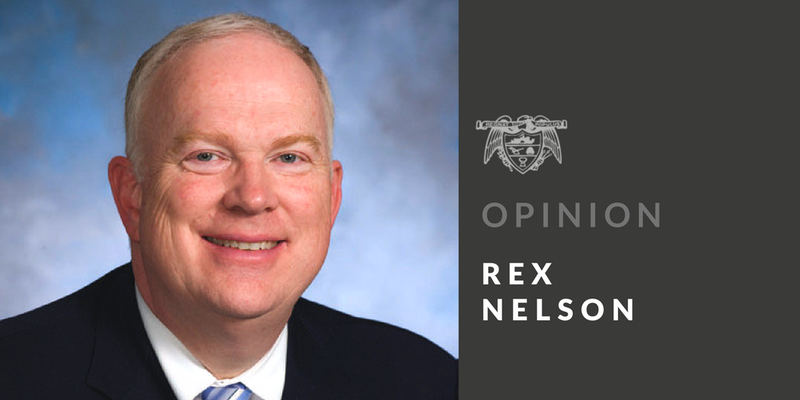The announcement didn't attract much media attention, but it was just the sort of news Little Rock needs more of in the years ahead.
Valk Properties Two, a Texas-based developer, announced that it will soon begin renovations at the AT&T Building on Capitol Avenue. It will transform the 10-story structure into what the company describes as a "high-tech space." Valk said that the 370,566-square-foot building will contain residential units, offices, retailers, entertainment venues, a fitness center and a landscaped veranda. The inside will be opened up to allow more natural light. The developer also is considering construction of a 750-space parking garage.
When a developer from the booming Dallas-Fort Worth Metroplex invests millions of dollars in Arkansas' largest city, it represents a vote of confidence. The developer is, in essence, saying that it thinks Little Rock's downtown is poised to take off in the same way that other downtowns in the region such as Nashville and Oklahoma City have done. There have been additional votes of confidence in recent weeks.
Trader Joe's, a popular grocery chain based in California, had ignored Little Rock for years. Now, the company appears prepared to put a store in the city.
Out at the Port of Little Rock, it was announced last month that a major gun manufacturer from the Czech Republic chose the city for its North American headquarters and first U.S.-based production facility. CZ-USA plans to invest $90 million and hire almost 600 people during the next six years. Preliminary work on a 265,000-square-foot facility has already begun on a 73-acre site. Little Rock's new mayor, Frank Scott Jr., hailed the news as "the largest jobs announcement in many, many years in Little Rock."
The company employs about 2,000 people worldwide and exports firearms to 90 countries. Bogdan Heczko, the CZ-USA chairman, said he received assurances from officials of Indian-owned Welspun Tubular and French-owned Dassault Falcon, which have nearby operations, that his business would be happy in Little Rock.
"They told us this friendship and this relationship is not only at the beginning," Heczko said. "It will last for many, many years."
So you have a Texas real estate developer, a California-based grocery chain and a manufacturer from the Czech Republic all showing confidence in a city that had been stagnant from a population standpoint for more than a decade. I've written numerous times through the years that Arkansas won't achieve its potential as a state unless its capital city does well. Northwest Arkansas and Jonesboro can't carry Arkansas by themselves at a time when most rural areas are losing population. Little Rock must also prosper. The city's success is important to residents in all 75 Arkansas counties.
The key is going to be attracting a lot more outside capital along the lines of the projects outlined above.
What are investors looking for these days? For starters, they want to invest in a place whose residents are willing to invest in themselves. Little Rock partially checked that box off with the announcement last week that more than $86 million in private funds have been raised for a massive renovation of the Arkansas Arts Center. Internationally known architectural firm Studio Gang has designed a facility that will allow sunshine to flow into the center. There will be a new restaurant with outdoor shaded seating and multiple connections to MacArthur Park. Construction is expected to begin in October and end in 2022.
Scott called the plans "a beacon of light for this city and region."
Outside developers now see a city that's willing to invest in itself and a place where their peers are willing to make significant investments. They see a city with a 35-year-old mayor who has boundless energy. What's left?
What's left is the major factor--the thing that will determine whether the successes of recent weeks continue. It's whether Scott and his new police chief, Keith Humphrey, can achieve their stated goal of making Little Rock one of the safest cities of its size in the country. Unfortunately, that effort is off to a rocky start.
Residents and outsiders alike are questioning Scott's decision to have an expensive security detail (which previous mayors didn't have), a decision the mayor says the police chief recommended. They're also questioning Humphrey's decision to fire Little Rock Police Department officer Charles Starks, who killed a 30-year-old career criminal who was trying to run over him with an automobile. Humphrey's decision came even though a veteran prosecutor investigated the death of Bradley Blackshire and refused to press charges against Starks.
There may be more to Starks' record with LRPD than has been made public. But I can tell you what outside investors see: They see a drug-addled (methamphetamine, PCP, marijuana and cocaine were found in Blackshire's body) repeat offender with a stolen handgun try to run over a police officer in a stolen car. They see the protests that have become oh-so-predictable in the wake of such incidents across the country regardless of the facts of each case. They see a police chief appear to make a decision that's designed to appease such protesters. They think to themselves: "This is like Baltimore." In that city, a succession of bad decisions by mayors and police chiefs led to chaos. They invest elsewhere.
Whether Little Rock can keep the momentum going largely will depend on whether Scott and Humphrey can indeed make it a safer city.
------------v------------
Senior Editor Rex Nelson's column appears regularly in the Arkansas Democrat-Gazette. He's also the author of the Southern Fried blog at rexnelsonsouthernfried.com.
Editorial on 05/25/2019
